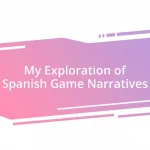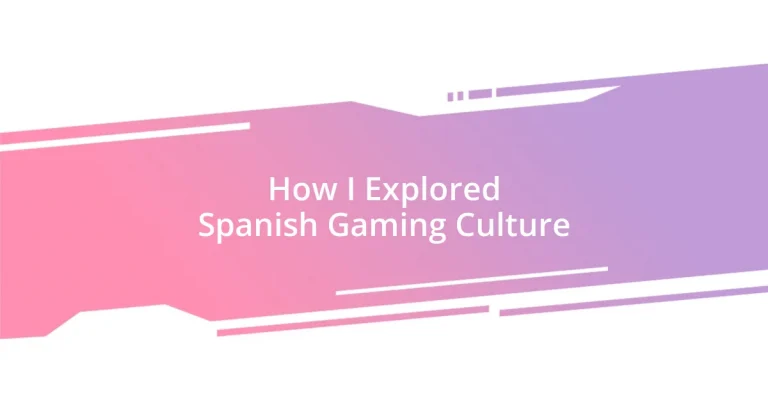Key takeaways:
- Spanish gaming culture emphasizes community and social connections, with games sparking national pride and camaraderie among players.
- Key gaming genres in Spain include action-adventure, RPGs, and a growing popularity of mobile games, with significant contributions from developers like MercurySteam and Tequila Works.
- The future of Spanish gaming is poised for growth in mobile gaming, immersive VR/AR experiences, and narrative-driven titles, reflecting the country’s rich cultural storytelling.
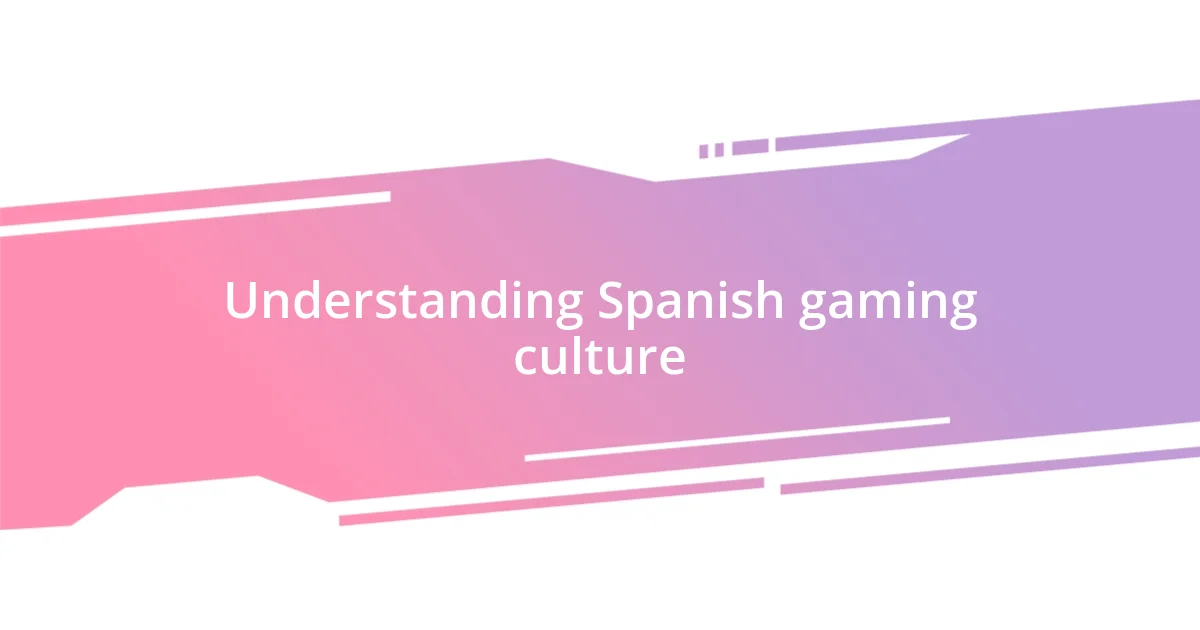
Understanding Spanish gaming culture
When I first delved into Spanish gaming culture, I quickly realized how deeply rooted it is in the social fabric of the country. Games are not just a pastime; they are a communal activity that brings friends and family together. I remember my first gaming night with Spanish friends, where the energy in the room felt electric—you could sense the excitement as competitive banter echoed off the walls.
One aspect that stood out to me is the emotional attachment Spanish gamers have to their local favorites, such as “League of Legends” and “Gran Turismo.” It’s fascinating how these games spark conversations about national pride and shared experiences. Have you ever played a game that made you feel connected to others in a special way? For me, it was a shared battle in “FIFA” that turned into an unforgettable night of laughter and friendly rivalry.
Another captivating facet is how traditional Spanish values weave into gaming. There’s a strong emphasis on teamwork and collaboration, reflecting their cultural appreciation for community. I’ve noticed that even in competitive matches, the spirit of camaraderie prevails, as players often celebrate each other’s victories. This blend of competition and support creates a unique gaming atmosphere that’s hard to replicate elsewhere.
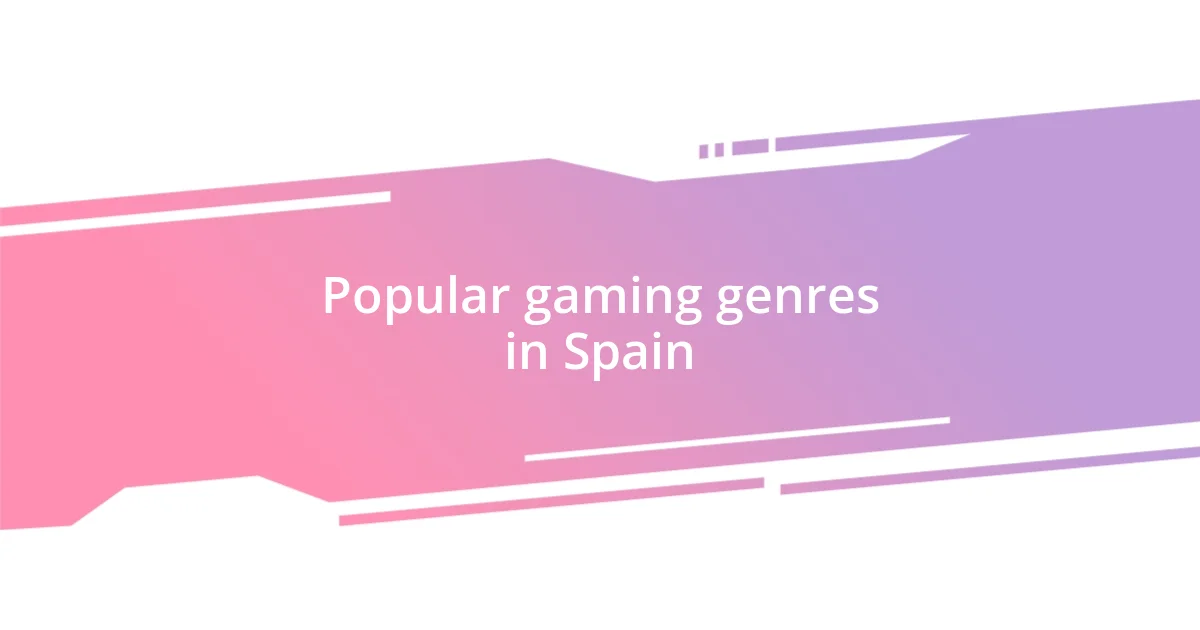
Popular gaming genres in Spain
The gaming genres popular in Spain reveal a lot about the country’s diverse interests. Action-adventure games like “Assassin’s Creed” captivate many, providing thrilling narratives that resonate with players. Personally, I found that immersing myself in a story-driven game sparked conversations that lasted long into the night, as we debated character choices and plot twists.
RPGs, or role-playing games, also hold a special place in the hearts of Spanish gamers. Titles like “Final Fantasy” not only offer extensive worlds to explore but also foster connections among players. I remember bonding with a group over our joint quest to defeat a particularly tough boss; it felt like we were on a heroic adventure together, and the friendships that formed were just as memorable as our in-game achievements.
A significant trend that caught my attention is the popularity of mobile gaming, especially casual games. It’s amazing to see how games like “Clash of Clans” and “Candy Crush” become social activities during coffee breaks or family gatherings. The ease of picking up a game on the go allows for spontaneous moments of fun—one of my favorite memories is a lively competition over who could clear a level the fastest during a long train ride.
| Genre | Popularity |
|---|---|
| Action-Adventure | High |
| RPG | Very High |
| Mobile Games | Increasing |
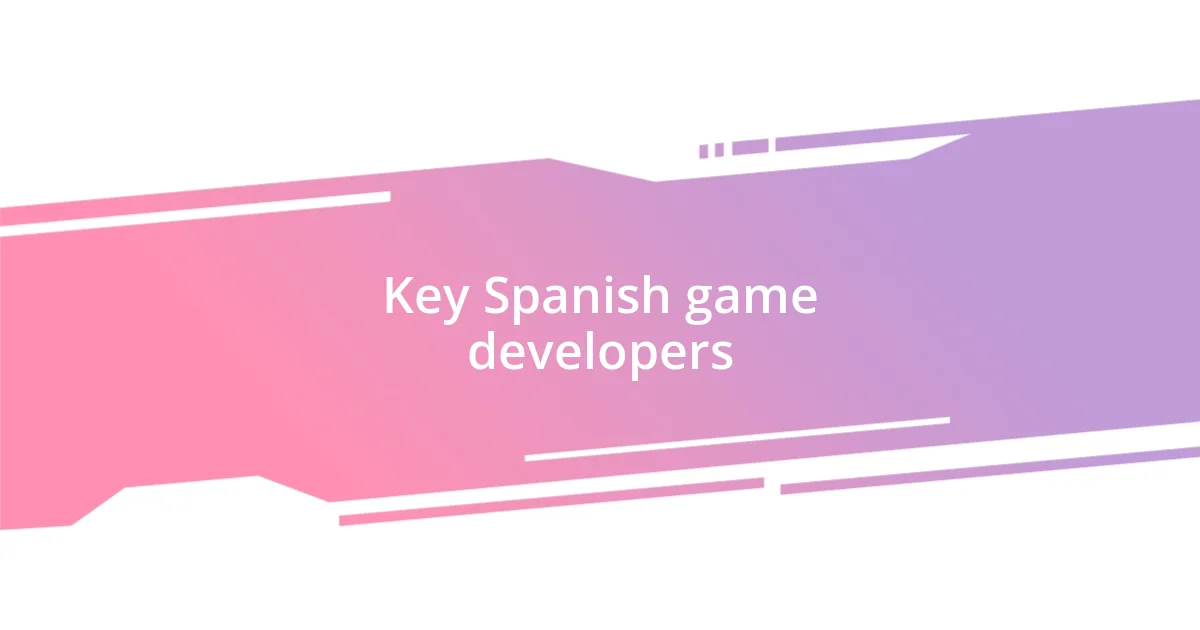
Key Spanish game developers
When discussing key Spanish game developers, several names stand out for their remarkable contributions to the industry. For instance, I’ve come to appreciate the innovative spirit of companies like MercurySteam, famous for their work on the “Castlevania: Lords of Shadow” series. Their attention to storytelling and gameplay mechanics really drew me in, and I recall playing late into the night, captivated by the atmospheric design and intricate narratives. Additionally, I’ve been impressed by Tequila Works, known for their unique art style in games like “RiME.” The emotional impact of their games made me reflect on the beauty of art in gaming, a reminder that video games can also be profound experiences.
Here are some key Spanish game developers and their notable contributions:
- MercurySteam: Renowned for “Castlevania: Lords of Shadow” and “Metroid: Samus Returns”.
- Tequila Works: Creator of visually stunning and emotionally charged games like “RiME”.
- Ninja Theory: Although originally British, they maintain a significant presence in Spain, with titles that push narrative boundaries.
- Novarama: Known for the “Invizimals” series, blending real-world experiences with virtual interactions.
Exploring the impact these developers have had on both the gaming community and the broader culture has been a rewarding journey for me, reinforcing my belief that gaming is an art form that connects us all in unexpected ways.
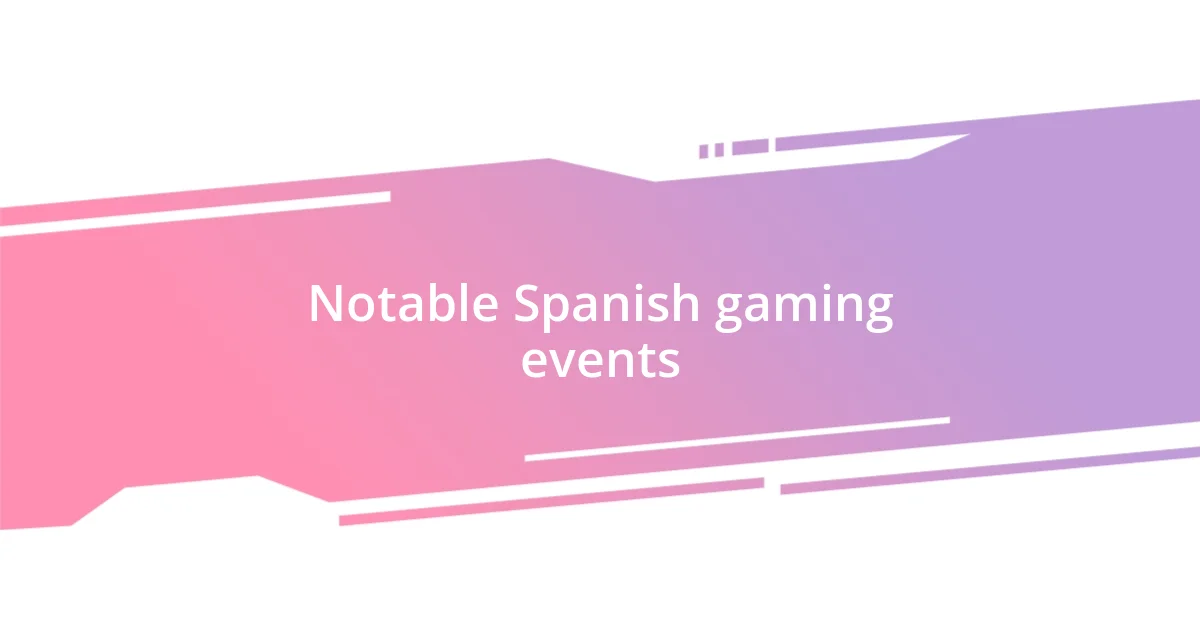
Notable Spanish gaming events
The world of Spanish gaming is punctuated by vibrant events that celebrate creativity and community. One standout is the Madrid Games Week, which I found to be a whirlwind of energy and excitement. Wandering through the halls, I recall the palpable thrill of watching esports competitions live; the tension in the air was almost electric, as fans cheered for their favorite teams. It made me realize just how deeply gaming has woven itself into the fabric of contemporary culture.
Another noteworthy event is the Barcelona Games World, which highlights both local and international developers. I remember striking up conversations with indie creators there, each sharing their unique visions and passion for gaming. It was fascinating to discover how many exciting projects were born right in Spain, making me ponder how many hidden gems are waiting to be explored beyond mainstream titles.
Additionally, the annual PlayStation Experience in Spain is a true testament to the country’s enthusiasm for gaming. The chance to engage directly with leading developers and experience upcoming game reveals creates a sense of community among fans. I distinctly remember the hushed anticipation as the curtain lifted on a much-anticipated game—a moment I’ll never forget. Have you ever experienced an event that made you feel so connected to a community? It’s moments like these that strengthen our bond as players and foster a shared love for gaming culture.

Engaging with the gaming community
When I think about engaging with the gaming community in Spain, I can’t help but recall my experiences in online forums. Often late at night, I’d find myself diving into discussions about upcoming titles or sharing strategies for favorite games. It was amazing to witness how passionate players could connect from different corners of the world, each bringing unique perspectives, and it made me feel like I was a part of something bigger. Have you ever felt that exhilaration while discussing a game you loved with fellow enthusiasts? It’s electrifying!
Meeting fellow gamers at local meetups has been another highlight for me. I remember attending a small gathering in a cozy café, where conversations flowed as easily as the coffee. Everyone eagerly swapped stories about their favorite gaming moments, and I found myself laughing along with others who understood the thrill of a hard-fought victory or the disappointment of a game that didn’t meet expectations. Those personal connections underscored the camaraderie unique to the gaming world.
Then there were my experiences streaming game playthroughs, which offered an incredible opportunity to interact with a wider audience. As I played through a horror title one night, the chat lit up with viewers sharing their own jumps and scares, giving me a deeper empathy for the shared thrill of gaming. It was a reminder that gaming isn’t just about individual experiences; it’s about the communities we foster and the bonds we create through shared adventures. How cool is it to realize that your gaming journey is intertwined with countless others?

Future trends in Spanish gaming
As I look toward the future of Spanish gaming, one trend that stands out to me is the rise of mobile gaming. I’ve seen firsthand how everyone—from young kids to adults—can’t seem to put down their smartphones. That makes me wonder, how many innovative games will emerge from local developers aiming to capture this expanding audience? Given the accessibility and convenience of mobile platforms, it seems like a natural fit for Spain’s vibrant gaming culture.
Another exciting shift is the increasing incorporation of virtual and augmented reality (VR/AR) experiences in gaming. I vividly remember trying out a VR headset at an event, feeling completely immersed in a fantastical world. The ability to transport players into a game in such an authentic way is something I’m eager to see more of from Spanish studios. Will we soon find ourselves exploring the picturesque streets of Barcelona in a game that feels all too real? I think it’s not just about the thrill of the experience; it’s about creating a connection to our own cultural landmarks.
Finally, I can’t help but notice the growing investment in narrative-driven games in Spain. There’s something special about storytelling in games that resonates with me, making the journey as captivating as the destination. I still cherish the rich narratives of some indie games I’ve discovered, and I anticipate even more creative storytelling that reflects our diverse culture. Do you think these narratives could inspire players to explore deeper themes or connect more personally with the characters? It’s a thrilling prospect that enriches the gaming landscape as we look ahead.










